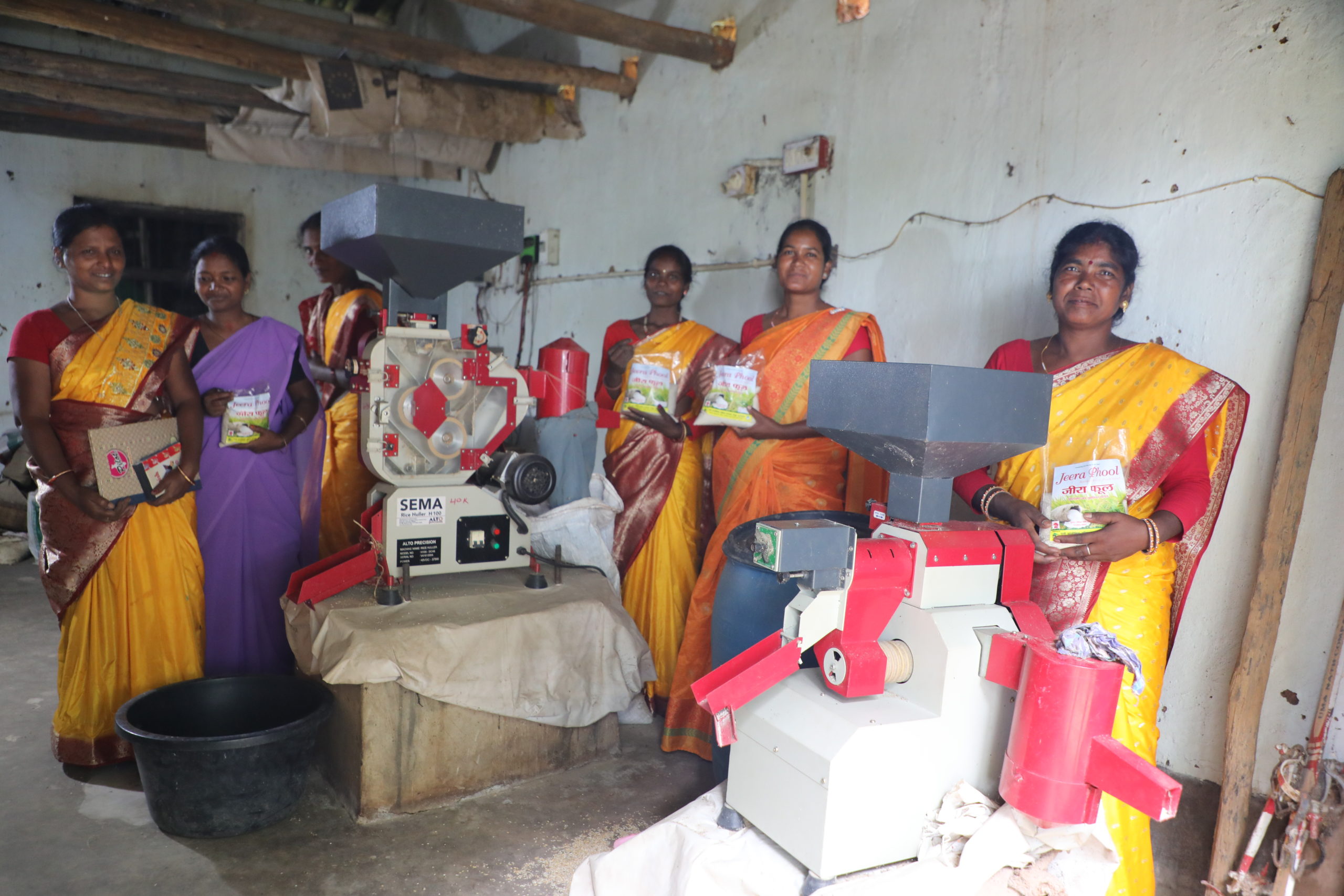Background
Kurokala village in Mahuadanr Block, Latehar district is a remote village with Santhal communities residing there. They are all small and marginal farmers who grow rice for one season and practice horticulture farming as well. The rice grown by these farmers are Black Jeera Rice and normal varieties of rice which they consume and sell. 300 households cultivate paddy in this cluster of Mahuadanr block with each household producing about 15-20 bags of paddy (10 quintals) per season. They keep enough paddy aside for self consumption and sell the rest. Life Education and Development Support (LEADS) NGO have members grouped in SHGs across the districts, some of which are driven by women participation and leadership. In Latehar and Ghumla districts alone, they have 1600 members who practice rice cultivation. These farmers live in very remote forested regions and are predominantly belonging to tribal communities.

Inputs, Outputs and Markets
Kisan Mahila Mandal is a women based SHG with 20 members who decided to take up the decentralized solar powered rice mill intervention as they observed the need for hulling of rice and polishing there. The nearest rice mill is in a town about 10 kms away which is centralized in nature. A small building infrastructure was set up with the help of the Jharkhand Livelihood Mission and the equipment, energy components were provided by SELCO Foundation in May, 2019. Multiple training sessions were conducted by SELCO Foundation staff for the women members. The women operate the machines, handle packaging, accounts, registers, maintenance etc.
Technological Solution
The huller and polisher are two separate components with the huller processing 60 kgs per hour and the polisher cleaning 50 kgs per hour. With the machines running for 6 hours, they can mill 3 quintals of produce per day. The decentralized mill is being run as a service model where they sell their produce through 4 middlemen who they have developed linkages with. Due to not having their own transportation, they sell to the middle men who come regularly and pick up the milled produce as well as paddy from the farmers. The middle men take the produce to markets in nearby towns like Daltonganj.
Learnings
Decentralisation supported not just this village but other villages during the COVID-19 induced lockdown. With this access being cut off, villagers from nearby villages of 5-6 kilometer radius started to come to the SHG run solar powered mill
The solar powering has been very useful during the lockdown as the region suffers heavy load shedding and frequent power cuts. If diesel were to be used as a backup fuel, they would take 2 days to procure diesel during the time of lockdown which would have hampered their service and production.
The SHG members have been returning the husk to the customers along with their hulled rice. The husk has many uses for the farmers in the form of mixing it with manure to make biofuel, using it as fuel to keep the pots going which they use to make alcohol and laying poultry farms with this base to revoke ammonia.
Pre Intervention scenario
Earlier in Latehar, there was no decentralized rice milling solution or service available. People had to go 10 kms to a centralized solution to get the service. Adopting this decentralized approach the SHG is much closer to their dream target of producing 20 packets x 20 kgs per day with processes including rice procurement, hulling, polishing & packing.
About the Partner
Life Education and Development Support (LEADS) is an organization that works in the districts of Jharkhand, primarily in Khunti, Hazaribagh, Laterhar, Ghumla (amongst others) to promote sustainable livelihood solutions in rural and tribal communities.
Impact
Income and profit: Even during the lockdown, due to the unit being located in a remote region, the SHG members remained unaffected and were allowed to operate through it. This brought in more customers, increasing their income and turning in profits.
Additional customer base: Due to the mills in the town being shut down as a result of the lockdown, people from nearby villages and towns started to use this service to mill their produce. At least 100 people recently accessing this mill have expressed to the SHG members that they will only come to their centre henceforth even post lockdown as it is more economical, convenient and time saving.
Awareness on solar: A lot of the visiting communities are seeing solar energy for the first time and have learnt of its existence, uses and applications beyond just lighting.
Combatting energy issues: The remote region suffers a lot of power cuts, frequent load shedding and voltage dips which would have required the SHG to rely on diesel, if it weren’t for solar. It takes 2 days to procure a batch of diesel and in the time of lockdown, it would have taken longer with additional permissions required to be able to access it, causing hindrances in their service.
